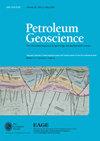东北大西洋大陆边缘法罗-设得兰盆地火山与非火山体系的相互作用及其找矿意义
IF 2.1
4区 地球科学
Q3 GEOSCIENCES, MULTIDISCIPLINARY
引用次数: 0
摘要
在法罗群岛大陆架上的法罗-设得兰盆地进行的勘探揭示了厚而复杂的火山序列,并在盆地中部发现了火山间含油硅碎屑砂岩扇矿床。要想在北大西洋火成岩省边缘形成这样的储层类型,需要更好地了解相互竞争的沉积和火山沉积输移系统之间的相互作用。我们重新检查了大贾德次盆地地区探井岩屑中的火山单元,以评估岩相和地球化学亲和力。这使得井的化学地层对比可以与绝对放射性年龄限制的法罗群岛玄武岩群进行对比。随后,将集体井数据与2D地震数据的区域解释联系起来,这有助于从几何结构、火山相、沉积环境以及与非火山沉积单元的交错等方面详细解释Judd次盆地区域火山序列的时间发展。Judd次盆地在裂解前和同裂解期间受到主要火山相的影响。这种影响既有直接的,以火山沉积物的形式存在,也有间接的,以阻碍已建立的沉积输送系统和创造新的物源区的形式存在。在裂解前火山活动期间,火山输送系统在不同时间到达Judd次盆地的不同区域。西部最早的侵入发生在古新世中期晚期(T序列T31/T32)。随着火山物质至少三次从地层上离散侵入Judd次盆地,每次侵入都有可能形成次火山和火山间地层和结构圈闭。本文章由计算机程序翻译,如有差异,请以英文原文为准。
Interaction between volcanic and non-volcanic systems and its implication for prospectivity in the Faroe–Shetland Basin, NE Atlantic continental margin
Exploration in the Faroe–Shetland Basin on the Faroese Continental Shelf has revealed thick and complex volcanic successions and discovery of inter-volcanic oil-bearing siliciclastic sandstone fan deposits in the central parts of the basin. The possibility for such play types at the fringe of the North Atlantic Igneous Province requires a better understanding of the interaction between competing sedimentary and volcanic depositional transport systems. We have re-examined volcanic units in cuttings from exploration wells in the greater Judd Sub-basin area for evaluation of facies and geochemical affinity. This allows for chemostratigraphical correlation of wells to the absolute radiometrically age-constrained Faroe Islands Basalt Group. The collective well data were subsequently tied to a regional interpretation of 2D seismic data which facilitated a detailed interpretation of temporal development of the volcanic successions in the Judd Sub-basin area in terms of geometry, volcanic facies, depositional environment, and interdigitation with non-volcanic sedimentary units. The Judd Sub-basin was influenced by major volcanic phases during pre-breakup and syn-breakup. The influence was both direct, in the form of volcanic deposits, and indirect, in the form of obstructing established sedimentary transport systems and creating new provenance areas. The volcanic transport systems reached different areas of the Judd Sub-basin at different times during pre-breakup volcanism. The earliest incursion in the west was during late Mid Paleocene (T-sequence T31/T32). With at least three stratigraphically discrete incursions of volcanic material into the Judd Sub-basin, possibilities arise for sub- and inter-volcanic stratigraphic and structural traps for each incursion.
求助全文
通过发布文献求助,成功后即可免费获取论文全文。
去求助
来源期刊

Petroleum Geoscience
地学-地球科学综合
CiteScore
4.80
自引率
11.80%
发文量
28
审稿时长
>12 weeks
期刊介绍:
Petroleum Geoscience is the international journal of geoenergy and applied earth science, and is co-owned by the Geological Society of London and the European Association of Geoscientists and Engineers (EAGE).
Petroleum Geoscience transcends disciplinary boundaries and publishes a balanced mix of articles covering exploration, exploitation, appraisal, development and enhancement of sub-surface hydrocarbon resources and carbon repositories. The integration of disciplines in an applied context, whether for fluid production, carbon storage or related geoenergy applications, is a particular strength of the journal. Articles on enhancing exploration efficiency, lowering technological and environmental risk, and improving hydrocarbon recovery communicate the latest developments in sub-surface geoscience to a wide readership.
Petroleum Geoscience provides a multidisciplinary forum for those engaged in the science and technology of the rock-related sub-surface disciplines. The journal reaches some 8000 individual subscribers, and a further 1100 institutional subscriptions provide global access to readers including geologists, geophysicists, petroleum and reservoir engineers, petrophysicists and geochemists in both academia and industry. The journal aims to share knowledge of reservoir geoscience and to reflect the international nature of its development.
 求助内容:
求助内容: 应助结果提醒方式:
应助结果提醒方式:


